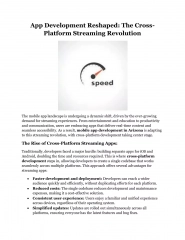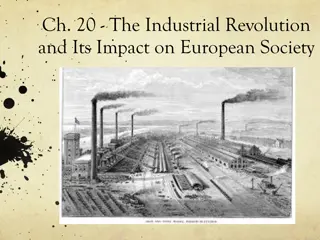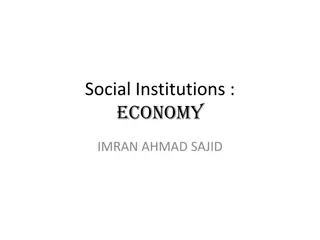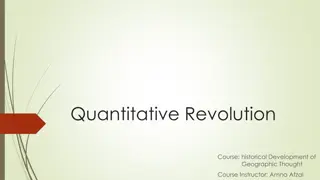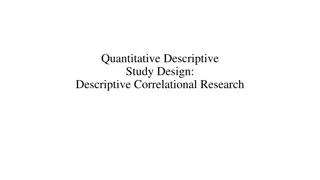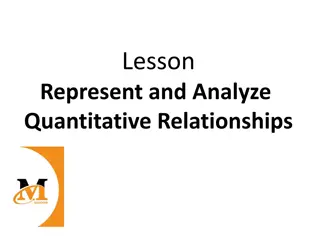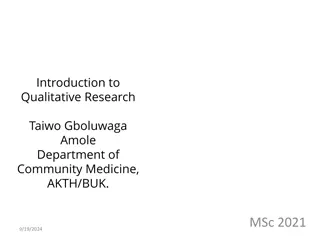Class Group Revolution Adapting to Modern Learning
Embrace the future of education with a Class Group revolution. Discover innovative approaches to modern learning, fostering a dynamic and interactive educational experience. Read full article https:\/\/explainlearning.com\/blog\/class-group-revolution-adapting-to-modern-learning\/
6 views • 2 slides
App Development Reshaped The Cross-Platform Streaming Revolution
The mobile app landscape is undergoing a dynamic shift, driven by the ever-growing demand for streaming experiences. From entertainment and education to productivity and communication, users are embracing apps that deliver real-time content and seamless accessibility. As a result, mobile app develop
1 views • 3 slides
AI in Financial Services: Digital Revolution and Fintech Disruption
The digital transformation in financial services is driven by AI, sparking a social revolution impacting all aspects of life. Industry 4.0 brought FinTech disruption, creating new ecosystems and partnerships for innovative financial solutions. Incumbents and regulators have responded with strategies
1 views • 21 slides
Are You Ready for Eyelash Extensions South Yarra's Beauty Revolution
This blog will delve into the world of eyelash extensions in South Yarra, answering the question: Are you ready for this exciting beauty revolution? We'll explore the benefits, different types of extensions, aftercare tips. Read full article \/\/ibrowandlashesau.medium.com\/are-you-ready-for-eyelas
1 views • 4 slides
The American Revolution: Causes, Events, and Consequences
The American Revolution was sparked by British government control over the colonies and imposition of taxes without representation. Key events such as the Boston Massacre and Boston Tea Party further fueled the revolt. The war ended in victory for America and led to the birth of a new nation. Explor
2 views • 7 slides
Overview of Research Process and Quantitative Research Phases
The research process involves steps like identifying, locating, assessing, and analyzing the research question to find answers. It includes quantitative and qualitative approaches, with specific phases like conceptual, design, empirical, analytic, and disseminating phases in quantitative research. E
9 views • 27 slides
Understanding Quantitative and Qualitative Research Methods
Exploring the differences between quantitative and qualitative research methods, this content delves into the importance of qualitative research, various methodologies such as focus groups and interviews, data collection, research ethics, and analysis techniques. It also covers the elements of the r
4 views • 43 slides
The Impact of Industrial Revolution on Society
The Industrial Revolution, spanning from 1760 to 1870, revolutionized manufacturing processes, transitioning from hand production to machines, introducing new chemical and iron production methods, and the use of steam power. It began in England and caused radical societal changes, leading to the ris
1 views • 34 slides
Understanding Earth's Rotation and Revolution
Explore the concepts of rotation and revolution of the Earth, including how they cause day and night, the Earth's tilt, and the effects on different hemispheres. Engage in a hands-on activity to visually understand these movements. Learn about the Earth's rotation and revolution around the sun and t
1 views • 21 slides
Impact of Industrial Revolution on European Society
The Industrial Revolution had a profound impact on European society, characterized by key terms such as Agricultural Revolution, Capital, Pig Iron, Wrought Iron, Tariffs, Cholera, and Trade Unions. This period saw advancements in agricultural techniques, the rise of material wealth for production, t
1 views • 24 slides
Evolution of Economic Institutions Through Technological Revolutions
Economies of modern nations have evolved over centuries through technological revolutions. The Agricultural Revolution led to the creation of a distinct economy with surplus production, job specialization, and trade. The Industrial Revolution further transformed production, leading to significant in
1 views • 35 slides
Evolution of Geographic Thought: Quantitative Revolution
The Quantitative Revolution in Geography, led by Schaefer's critique of traditional views, propelled the shift towards a more objective and scientific approach. Embracing statistical and mathematical techniques, geographers sought regularities in spatial organization, marking a transition from areal
1 views • 11 slides
Understanding Earth's Rotation and Revolution
Explore the concepts of rotation and revolution as they relate to Earth's movement in space. Learn how rotation results in day and night, and how revolution around the Sun leads to the changing of seasons. Discover the difference between real and apparent motion in celestial bodies.
2 views • 7 slides
The Impact of the Fourth Industrial Revolution on Service Delivery in the Public Service
Public service plays a vital role in society, with the Fourth Industrial Revolution (4IR) bringing significant changes. This revolution, characterized by rapid technological advancements, is reshaping how services are delivered in South Africa and globally. The fusion of digital, biological, and oth
0 views • 19 slides
Green Revolution: Transforming Agriculture for a Sustainable Future
The Green Revolution marked a significant period in global agriculture with the introduction of new technologies like chemical fertilizers, pesticides, and high-yielding seeds. This revolution, attributed to Norman Borlaug, boosted crop productivity, ensured food security, and saved millions from fa
2 views • 11 slides
Contrasting Qualitative and Quantitative Traits in Genetics
Genetic traits in organisms can be qualitative or quantitative, with qualitative traits controlled by single genes and showing distinct variations, while quantitative traits are influenced by multiple genes and environmental factors, resulting in continuous variations. Qualitative genetics focuses o
0 views • 13 slides
Understanding Quantitative Research Design in Social Science
This content covers various aspects of quantitative research design, including descriptive and correlational studies, research design blueprint, robust research design considerations, and different types of research approaches. It emphasizes the characteristics, techniques, and terminologies associa
0 views • 24 slides
Understanding Quantitative Analysis for Decision Making in Management
Quantitative analysis is a crucial scientific approach for managerial decision-making, involving data manipulation to derive valuable information. This method encompasses problem definition, model development, and acquiring input data. Mathematical models, variables, and parameters play key roles in
0 views • 11 slides
Qualitative vs. Quantitative Approaches in Health Research
Exploring the different methodologies, paradigms, and methods used in health research, this content highlights the distinction between qualitative and quantitative designs. It covers research questions, aims, objectives, hypotheses, and various quantitative approaches such as experimental and observ
1 views • 28 slides
Understanding Quantitative Genetics Principles in Animal Breeding
Quantitative genetics focuses on the inheritance of characteristics based on degree rather than kind, compared to qualitative genetics. It involves polygenes controlling quantitative traits, which exhibit continuous variation and can be measured using metric units. Qualitative traits, on the other h
0 views • 22 slides
The Russian Revolution: A Historical Overview
The Russian Revolution of 1917 was a pivotal moment in world history, marked by a series of events including the March and October Revolutions, the rise of the Bolsheviks led by Lenin, and the subsequent Russian Civil War between the Whites and the Reds. The revolution saw the overthrow of the Tsari
3 views • 26 slides
Understanding Quantitative Research in Social Studies: A Comprehensive Overview
An in-depth exploration of quantitative research methods in social studies, covering concepts, data analysis, survey techniques, causality identification, and setting up research projects. Emphasizes the importance of grasping strengths, pitfalls, and key points in quantitative research and understa
0 views • 51 slides
Project EDDIE: Enhancing Student Quantitative Reasoning with Large Datasets
Project EDDIE focuses on improving student quantitative reasoning through inquiry-driven exploration of complex datasets. The project aims to support instructors in guiding students to enhance their understanding of scientific concepts and quantitative skills. With a commitment to community and lear
0 views • 6 slides
The Rise of Nationalism in Europe: French Revolution and Revolutionary France
The rise of nationalism in Europe during the French Revolution and Revolutionary France era is explored, defining key terminologies like Absolutist Institutions, Utopian, Charter of the Rights of Man, Nation State, Modern State, and Multi-National Dynastic Empires. The French Revolution marked the f
1 views • 15 slides
Understanding and Representing Quantitative Relationships
Explore how to represent and analyze quantitative relationships using graphs, tables, and equations. Practice with unit rates, plotting points in a coordinate plane, and understanding independent and dependent variables. Develop skills in creating equations, tables, and graphs to model relationships
0 views • 120 slides
Impact of the Industrial Revolution on Society and Ideals
The Industrial Revolution, spanning from 1760 to the late 1800s, revolutionized manufacturing, leading to improved living standards in the developed world. Mechanization, new energy sources, steam engines, and railways transformed production and transportation, fostering innovation. Despite the Fren
1 views • 15 slides
The Evolution of the American Revolution
Thirteen Colonies break free, triggering an ongoing revolution against British rule. Explore key events like the Pilgrims arriving, the Declaration of Independence, battles, and pivotal figures. Discover how the revolution's aims evolved and the stages of revolution according to historian Ben Marsh.
4 views • 13 slides
World History Standards and Scope for Grades 10-12
This document outlines the standards and scope for Grade 10 World History, covering topics such as the foundations of modern world history, historical research, ethical principles in ancient philosophies, revolutions, and the Industrial Revolution. Students will analyze key events and philosophies s
0 views • 20 slides
Hungarian Revolution of 1956: Impact on the Cold War
The Hungarian Revolution of 1956 marked a significant episode in the Cold War era, challenging Soviet dominance and leading to widespread consequences. The uprising, led by Imre Nagy, faced brutal Soviet suppression, resulting in thousands of casualties and reinforcing Soviet control over Hungary. T
0 views • 10 slides
American Revolution Key Events and Reactions
The journey of the American Revolution unfolds through key events such as the French and Indian War, British taxation policies, colonial resistance, and the push for independence. Each step led to escalating tensions between the colonies and Britain, culminating in acts of defiance and the start of
0 views • 13 slides
The Road to Revolution: Beginning Causes and Impact of Mercantilism
The road to the American Revolution started with the colonists feeling a sense of independence from Britain and being impacted by mercantilism. Mercantilism led to restrictions on trade, enforcement of Navigation Laws, and economic hardships for the colonies, but also provided some benefits such as
0 views • 26 slides
Understanding Research Methods in Public Health
Exploring the nuances of qualitative and quantitative research methods in the context of public health, this content delves into how each approach offers unique insights and perspectives. It discusses the importance of qualitative research in uncovering underlying factors influencing health, interpr
0 views • 77 slides
Transformation Through the Industrial Revolution
Before the Industrial Revolution, people lived in small villages, making things by hand and growing their own food. The Industrial Revolution changed this by enabling people to work in factories, leading to urbanization. Britain, with ample coal and iron resources, played a significant role in kicks
0 views • 13 slides
A Revolution in Politics: French Revolution and Its Impact
The content explores the political, economic, and social factors that led to the French Revolution, alongside thematic questions regarding the era of the French Revolution and Napoleon. It also delves into the causes and outcomes of the American Revolution and its impact on Europe, highlighting key
0 views • 12 slides
German Revolution of 1918: Source Areas and Military Defeat
The German Revolution of 1918 saw a complex interplay of events, from military defeat to political maneuvers. The myth of the army being stabbed in the back, Ludendorff's attempts to shift blame, and the revolution from above orchestrated by elites all shaped this pivotal period in German history. D
0 views • 14 slides
Quantitative Research Framework for Historical Disciplines
Scholarly communities in historical disciplines are combining quantitative and qualitative methods to study phenomena that change over time. The proposed general methodological reflection aims to enhance research in historical linguistics through quantitatively driven models and claims. Quantitative
0 views • 18 slides
Overview of the Russian Revolution and World War I
In this informative content, the Russian Revolution and World War I are explored in detail. Topics covered include the main causes of WWI, the phases of the Russian Revolution, the impact of World War I on Russia, and the consequences of the Russian Civil War. The content also delves into the pre-re
0 views • 14 slides
Understanding UV-Visible Spectrophotometry for Quantitative Analysis
Spectrometry in quantitative analysis involves determining substance concentration through spectrophotometry. UV-Visible Spectrophotometry measures light absorption in the UV or visible region using the Beer-Lambert Law, relating absorbance to substance concentration. The electromagnetic spectrum en
0 views • 15 slides
Empowering Through Quantitative Literacy: A Roadmap to Mathematical Empowerment
In a modern society filled with data and statistics, quantitative literacy is essential for individuals to think critically, question authority, and make informed decisions. The ability to understand and engage with mathematical concepts is crucial for addressing complex issues and thriving in today
0 views • 15 slides
Understanding Quantitative Data Analysis in Research
Dive into the world of quantitative data analysis with a focus on frequencies, central tendency, dispersion, and standard deviation. Explore the collection and analysis of numerical data, levels of measurement, and methods for quantifying social concepts. Learn about the importance of capturing data
0 views • 25 slides

